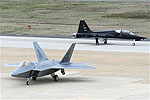T-38 arrives to supplement F-22 training
 LANGLEY AIR FORCE BASE, Va. (AFNS) -- Following a successful test run in March 2010 and approval by Air Combat Command officials, the first of several T-38 Talons from Holloman Air Force Base, N.M., arrived here April 1 for the beginning of the 1st Operations Group's T-38 Adversary Air Program.
LANGLEY AIR FORCE BASE, Va. (AFNS) -- Following a successful test run in March 2010 and approval by Air Combat Command officials, the first of several T-38 Talons from Holloman Air Force Base, N.M., arrived here April 1 for the beginning of the 1st Operations Group's T-38 Adversary Air Program.
Col. Matt Molloy, the 1st Fighter Wing's commander, and Col. Kevin Mastin, the 1st FW's vice commander, escorted the aircraft to here to bolster F-22 Raptor training using cost-effective training exercises and supplementing flight training for future pilots.
Following the completion of an environmental survey in the fall, the planes will be reassigned permanently to the 1st FW. Wing officials expect to receive the remaining six T-38s gradually over the coming months.
According to Lt. Col. Derek Wyler, the 1st OG Adversary Air Program lead, the program provides adversary support for training scenarios. The T-38s will serve in a "red air," or enemy capacity, while F-22s will fly as "blue air," or friendly forces. Each T-38 can be flown as often as three times daily to provide adversary support at a fraction of the cost of launching a Raptor.
The reduction of flying time on the Raptor combined with the lower operating cost of the T-38s will save the wing considerable money, officials said.
"The reduction in the Air Force's inventory of fourth-generation fighters (F-15s) placed an increased emphasis on finding a suitable, yet cost-effective platform to keep F-22 pilots current with combat readiness training," Colonel Wyler explained. "This T-38 program is a very economical solution to a difficult problem."
In addition, the T-38s serve as proficiency trainers for F-22 pilots as the aircraft is difficult to detect when airborne.
"This will sharpen the talons of the Raptor pilots," Colonel Molloy said. "The T-38 is small, nimble and difficult to find in the air. Combine that with a low radar cross-section and low electromagnetic emissions, and this plane will punish a Raptor pilot's mistakes if they make them."
These processes will take time to build and perfect, but the arrival of the T-38 is the first step in bringing the project to fruition.
"This is the culmination of a long road," Colonel Wyler said. "It took a lot of work by a whole lot of people to bring these planes here. Finally getting an airplane on the ramp at Langley is a big event."